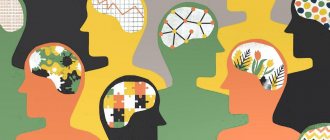Different peoples have their own historically established teaching methods, reflecting their national traditions, spirituality and identity. Family upbringing and the peculiarities of the individual’s perception of reality manifest themselves as the influence of culture on the formation of a person’s personality. The transfer of cultural experience to younger generations makes it possible for young people to adopt, develop and enrich the diversity of spiritual values of their people.
What is personality
It is important to understand what personality is. This concept is often confused with the concept of individuality, especially in relation to children. Parents often say that their 4-year-old child has already formed a personality because he loves certain music. But psychologists note that the preference for certain music in children speaks not about personal characteristics, but about individuality. It also includes temperament, some abilities, etc. This greatly influences the development of personality, but is not a determining factor.
Awareness of oneself as an individual in children occurs when certain criteria are determined:
the child fully uses personal pronouns; he can describe himself, even on a primitive level, talk about his own problems and feelings; he has self-control skills. And children's tantrums due to insignificant reasons indicate insufficient personal development; The baby has basic ideas about the concepts of “bad” and “good.” He knows how to refuse what is “bad”, to sacrifice his immediate desire for the common good.
Factors in personality development
Despite the fact that personality is mostly formed in the course of communication with others, there are some factors in the formation of personality that can influence this process:
Initially, the formation of personality is influenced by the genetic characteristics of a person, which he received at birth. Heredity is the basis for the formation of personality. Such qualities of a person, such as physical features and abilities, influence the formation of his character, as well as the method of perceiving other people and the world around him. Heredity explains a lot about the characteristics of a person, his differences with other individuals, since there are no 2 identical individuals;
Another factor that is important in the development of personality is the influence of the physical environment. The nature that surrounds a person influences behavior and takes part in the creation of personality. For example, scientists associate climate factors with the emergence of different civilizations. People who grew up in different climates are different. The most striking example is the comparison of people from the steppe, mountain and jungle areas. Nature influences us in many ways; The third factor in personality development is cultural influence. Any type of culture has a specific set of values and norms. It is common to members of the same group or society. Therefore, representatives of each individual culture must be understanding of such values and norms. Because of this, a modal personality appears, it embodies general cultural characteristics, they are instilled by society in its members in the process of cultural experience. It turns out that the current society, using culture, creates sociable individuals who easily make social contacts and cooperation;
Another factor is the social environment. It is worth recognizing that such a factor is considered the main one in the process of developing the qualities of an individual. The influence of such an environment occurs through socialization. This is the process by which an individual assimilates the norms of the group so that through the formation of the “I” the uniqueness of the individual is manifested. Socialization takes many forms. For example, there is socialization through imitation, generalization of various forms of behavior; The fifth element that shapes personality is a person’s own experience. The essence of its influence is that a person finds himself in various situations where he experiences the influence of other individuals and the environment.
Option 1
Literary critic V.G. Belinsky said: “Nature creates man, but society develops and forms him.” One cannot but agree with his words. I believe that the author of this expression very accurately defined the meaning of society in the life of every person. A person cannot fully develop outside of society; only through communication and interaction with others is a human personality formed. From early childhood and throughout our lives, we are influenced by loved ones who instill in us social norms. It depends only on the environment what kind of person will become and what life priorities he will choose.
A striking example of negative social influence on the formation of a person’s personality is the novel in verse by A.S. Pushkin "Eugene Onegin". The main character of the novel is a young nobleman of the early 19th century. He received a typical upbringing and education for his time and class. But over time, Eugene realized that social life was empty and meaningless. However, he could not turn away from her, because he grew up in this environment and was afraid of her condemnation. On the one hand, he despised the opinion of high society, and on the other, he was completely dependent on it. Onegin was a real victim of the prejudices of secular society; he performed all his actions as expected, fearing that those around him would condemn him.
The main character, out of fear of being judged by society, agreed to a duel with his friend, in which he was killed. After Lensky's death, he could no longer stay in the village and went on a trip to Russia. This trip already symbolized his rejection of established orders, because in secular society it was not customary to travel to the cities of his native state; it was fashionable to travel around Europe. The murder of his friend shocked him and revealed to him the true picture of life. After returning from the trip, Onegin’s final break with society and the subsequent moral revolution occurred. Now the main character turns out to be capable of deep feelings and, despite the refusal he received, will never be the same.
Another example in fiction of a personality formed under the influence of society is the main character of the novel M.Yu. Lermontov "Hero of Our Time". Grigory Pechorin is a typical representative of his time. This is an intelligent, well-educated officer sent on duty to the Caucasus. Pechorin is part of secular society and lives by its laws. From an early age he found himself under his bad influence; those around him blamed him for something that did not actually happen. Kindness and sincerity were mistaken for meanness and lies, so over time the main character really became vindictive, learned to deceive, hate and envy. Pechorin himself characterizes himself as a “moral cripple.” He realizes that he has lived a meaningless and empty life and sees no meaning in his existence. The surrounding society deprived him of this meaning and made him a “superfluous” person.
Based on the above, we can come to the conclusion that it is society that forms the basic values of a person, which directly affect his character and the development of his personality. We see how different these values are throughout the history of the whole world. They depend on social ideas and ideals of a particular time, because they are formed as a result of the activities of certain people, states, and governments. Society plays the most important role in the development of the human personality, but man also has a significant influence on the formation of society as a whole.
Development of a child's personality
Let’s figure out at what age the process of developing a child’s personality occurs. If we take into account some factors, it becomes clear that a child is not capable of being an individual before the age of 2. Usually, this happens after the baby learns to speak, share opinions with others, and think about his own actions.
More often, psychologists note that the age of three is a significant point when a child develops self-awareness. But by the age of 4-5, he is fully aware of himself as a person who has some characteristics and values. It is important for parents to understand the process of developing a child’s personality, as it is related to the approach to parenting.
The requests that can be made of him depend on how deeply the child understands himself as a person. To properly raise a child, you need to have an understanding of the characteristic signs of psychology at various stages of development. Children under one year old do not know how to control their emotions, so it is pointless to explain to them that crying on the street is shameful and ugly. They are still entirely focused on immediate needs. At this stage, it is important for parents to understand that this is normal child behavior and they do not need to be punished for it.
Another situation: the baby is one year and 3 months old. His parents consider him an adult, because he can walk and speak some words, go to the potty. In general, he is already a little adapted to controlling emotions. After all, after a serious conversation, he will stop screaming, he knows how to be affectionate if he needs attention. But the baby uses the ability to control himself during such a period selectively when it turns out to be important for him personally. And here again mom and dad consider him spoiled.
And this behavior is natural at this time. Having initial abilities for self-control, the baby does not yet have the required motivation to limit himself. He doesn’t understand where the positive is and where the negative is. A certain moral maturity appears after 2 years, and sometimes by 3 years. It is associated with serious developments in social experience and better mastery of speech.
It turns out that, in accordance with current ideas about the development of personality, the upbringing of babies up to one year is based only on the organization of suitable conditions for comprehensive development. After a year, the child needs to be introduced to some of the norms of society, but do not immediately demand compliance with them. After 2 years of age, it is worth appealing to moral standards more persistently, but after 3 years, you can demand compliance with the rules. If at 3.5-4 years old a child constantly offends his peers and spoils toys, then this is evidence of gaps in upbringing or psychological problems.
The role of heredity in the development of human personality.
Heredity refers to the reproduction in descendants of biological similarities with their parents.
Heredity is a person’s genetic program that determines his genotype.
Hereditary programs of human development include deterministic and variable parts, which determine both the general things that make a person human and the special things that make people so different from each other.
1. The deterministic part of the hereditary program ensures, first of all, the continuation of the human race, as well as the specific inclinations of a person as a representative of the human race, including the inclinations of speech, upright walking, labor activity, and thinking.
2. External characteristics are passed on from parents to children: body features, constitution, hair, eye and skin color.
3. The combination of various proteins in the body is strictly genetically programmed, blood groups and the Rh factor are determined.
4. Blood diseases (hemophilia), diabetes mellitus, and some endocrine disorders—dwarfism—are hereditary.
5. Hereditary properties also include features of the nervous system, which determine the character and characteristics of the course of mental processes.
6. The inclinations for various types of activities are inherited.
Every child by nature has four groups of inclinations: intellectual, artistic and social. Inclinations are a natural prerequisite for the development of abilities. A few words need to be said about intellectual (cognitive, educational) inclinations. All normal people naturally receive high potential for the development of their mental and cognitive powers.
The existing differences in the types of higher nervous activity only change the course of thought processes, but do not predetermine the quality and level of intellectual activity itself. But teachers and psychologists admit that there may be heredity unfavorable for the development of intellectual abilities. Negative predispositions are created, for example, by sluggish brain cells in children of alcoholics, disrupted genetic structures in drug addicts, and hereditary mental illnesses.
The question of the inheritance of moral qualities and psyche is very important. The leading position of Russian pedagogy was the statement that all mental and moral qualities of an individual are not inherited, but acquired in the process of interaction of the organism with the external environment. It was believed that a person is not born evil or kind, generous or stingy, and especially not a villain or a criminal. Children do not inherit the moral qualities of their parents; human genetic programs do not contain information about social behavior.
Western pedagogy is dominated by the assertion that human moral qualities are biologically determined. People are born good or evil, honest or deceitful, nature gives a person pugnacity, aggressiveness, cruelty, greed (M. Montessori, K. Lorenz, E. Fromm, A. Micherlik, etc.).
Recently, domestic specialists have also begun to take a position on the genetic determination of social behavior. Academicians P.K. Anokhin, N.M. Amosov and others speak out in favor of the hereditary conditioning of human morality and his social behavior.
The influence of the environment on personality development.
The reality in which human development occurs is called the environment. The development of a person’s personality is influenced by the natural-geographical environment, the macro-environment - society, in the totality of all its manifestations, the micro-environment - the immediate environment of a person. There is no such thing as an abstract environment. There is the state, the specific living conditions of a person, his family, school, friends. Naturally, a person reaches a higher level of development, where the near and distant environment provides him with the most favorable conditions.
The home environment has a huge impact on human development in childhood.
The role of education in personality development.
The influence of heredity and environment is corrected by education. Education is the main force that can give society a full-fledged personality.
The effectiveness of educational influence lies in purposefulness, systematicity and qualified leadership. What are the types of influence in upbringing and the mechanisms of influence on the child?
Influence in education is a form of implementation of the functions of a teacher, the activity of a teacher, in a single process of social interaction, leading to a change in any features of the student’s individuality, his behavior and consciousness.
| Mechanisms of influence on the child: There are four main mechanisms of influence in the education process: 1. Persuasion is a logically reasoned influence on the rational sphere of consciousness of students. Creating, strengthening or changing views, assessments, attitudes. 2. Suggestion – influence on the student’s consciousness. 3. Contagion is the unconscious subordination of a group of students to the emotional influence of the teacher. Infection occurs through the transmission of a psychological mood. 4. Example - actions that are imitated. Action as an example of something. It must be remembered that the weakness of education is that it is carried out on the consciousness of a person and requires effort on his part, while heredity and environment act unconsciously and subconsciously. You can achieve a lot through education, but you cannot completely change a person. Education makes a different contribution to the destinies of people - from the most insignificant to the greatest possible. If a teacher wants to raise a child, then he must involve him in activities that improve the child’s environment. If the child is not involved in such activities, then there will be no upbringing in the positive sense of the word. Recognition of the activity of the individual as the leading factor in its development raises the question of purposeful activity, self-development of the individual, i.e. continuous work on oneself, on one’s own spiritual growth. The personality must move from being an object of education to the status of a subject. A subject is a person whose activities are characterized by four qualitative characteristics: - independent; — subject; - joint; - creative. When solving a particular pedagogical problem, the teacher encourages students to perform certain activities or prevents undesirable actions. In order for students to begin to show their own activity, this influence must be realized by them and turn into an internal stimulant, a motive for activity. At a certain stage of personality development, its intellectual abilities and social self-awareness, a person begins to understand not only external goals for him, but also the goals of his own upbringing. He begins to treat himself as a subject of education. With the emergence of this new, very unique factor in the development of personality, a person himself becomes an educator. Self-education is a systematic and conscious human activity aimed at self-development and the formation of a basic personal culture. Therefore, world pedagogy increasingly views the pupil as a naturally active, internally active being, provided with the necessary inclinations and incentives for self-development, and education as an objective-subjective process of self-development and self-education of the child’s personality in a system of organized and spontaneous interactions and relationships. We are talking about the natural subjective activity of the individual, formed under the influence of needs, instincts, drives, desires, abilities, desire for self-expression and self-affirmation. For pedagogy, what is of great importance is not whether the individual has consciously isolated himself or not from his environment, but whether he has been isolated by the environment - the educational system, first of all - from the social whole and whether he is recognized as a subject - an individual, endowed with activity and abilities that The first moments of a child’s life must be preserved, developed, and, if necessary, corrected with his active participation, through his activities. If pedagogy does not recognize this, if education is not guided by this position of subjectivity of the student, then this is not pedagogy, but the science of training and practical coaching. |
The role of parents in the development of a child’s personality
The role of parents in the development of a child’s personality and value system is very high. There are some rules that should be followed so that over time the baby does not face the problem of perceiving his own personality:
Formation of an adequate assessment of oneself.
You should not compare your baby with others, in any way. This is very important when comparing personality traits. It is important for a child to understand that he is good on his own, and not in comparison with someone else. If you want to praise your baby, do not use the comparative degree.
Encouraging communication.
It is important to ensure that your child interacts with adults and peers. This way he will be able to socialize faster and see the norms of behavior from his own experience.
The gender aspect in education should not be ignored.
From 2.5 years to 6 years, the baby experiences the oedipal phase. During this process, the child must develop an adequate gender self-identification, as well as a first understanding of gender relations. At this stage, you need to be attentive to the baby, give him care and love. But do not pay attention to provocations, show by your example how the relationship between spouses is formed. Incorrect parental behavior will cause the child to develop an Electra or Oedipus complex and other disorders.
Teaching morals and ethical standards.
Explain to your child in detail what principles of ethics are the basis for communication between people. Explain the concepts of honesty, positivity and negativity. The child’s inability to balance his own behavior and social norms leads to conflicts and unsuccessful communication with other people.
Socialization of personality
The development of personality through cultural means is an important and necessary stage in the socialization of a child in the overall process of his assimilating the experience of social life and relationships. Man by nature is a social creature.
All the stories and facts describing cases of human cubs, the so-called Mowgli, being forced into an isolated environment indicate that such babies will never be able to become full-fledged members of society. It is difficult for them to master speech, simple forms of communication, and rules of behavior. Without constant supervision, they die prematurely. Such examples clearly demonstrate the role that cultural values play in society.
In different societies, methods of education have many differences, but the role of culture in the socialization of the individual is difficult to overestimate. Rousseau described two ways of forming an individual:
- moral;
- political.
Although incompatible with each other, each path separately allows one to grow either a person with a spiritually pure beginning, or a citizen who lives to serve society. Two centuries later, Rousseau's philosophy was developed by existentialists , talking about the ideas of loneliness and about a society in which a person becomes a slave to established rules and norms.
The topic “What is the influence of cultural processes on the process of socialization of an individual” is included in the general education school curriculum in social studies in the sociology section. Questions about it are found among the tasks on the Unified State Exam.
Thus, considering the role of culture in the development of man and society, we can note its colossal influence both on society as a whole and on the individual. Culture shapes the personalities of members of society and provides a person with resources to overcome problems, especially psychological ones. Being a mirror of the human soul, it briefly reflects his activities, elements of good and bad personal qualities.











